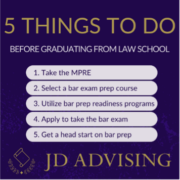MEE Frequency Analysis: Don’t get tricked!
 MEE Frequency Analysis: Don’t get tricked!
MEE Frequency Analysis: Don’t get tricked!
When you are analyzing the frequency of MEE subjects there are a few important things to keep in mind so that you do not mis-analyze MEE frequency.
Here we tell you a few things to keep in mind so you don’t get tricked!
MEE Frequency Analysis: Don’t get tricked!
When analyzing MEE frequency analysis, here are a few important points to keep in mind:
First, don’t look too far back.
Some students try to analyze MEE frequency by looking back, say 15 or 20 years, and counting how often a subject has been tested. But this will give you skewed data because six of the MBE subjects (Real Property, Evidence, Torts, Constitutional Law, Criminal Law & Procedure, and Contracts) were just added in 2007. So it is more helpful to start after those subjects were added in determining frequency. There are tested in about 50% of MEE questions now!
Second, it means a lot more to focus on the subjects that the National Conference of Bar Examiners (NCBE) has included on its 6-question exam (which the chart above reflects) rather than focusing on all subjects the NCBE has made available to states to choose from.
A little history: The NCBE used to distribute between 7 and 9 questions for jurisdictions to choose from. That way, states that crafted their own MEE exams could choose whichever six subjects the wanted to include on their exam. States that did not craft their own exam but let the NCBE choose which questions to administer in their six-question exams would just use whatever six questions the NCBE chose to administer. This means that the NCBE would, for example, usually draft a family law question but would not necessarily include it on its six-question MEE exam (but would make it available for states to include on their MEE exams). What the NCBE actually included on its six-question exam means a lot more than looking at all the questions it chose to write for states to include on their state exams, because the NCBE’s choices of what to include shows you what the NCBE thinks is most important. (If you want to see a chart that includes all the subjects that the NCBE distributed for states to choose from check out our MEE frequency chart here – the X’s in red mean that the NCBE did not choose to include those questions on its exam.)
Third, be aware of other events that may affect trends.
For example, Civil Procedure was added to the multistate bar exam (MBE) in 2015. Now, we can see, it is not tested every single exam. Before the NCBE was discussing adding it to the multistate bar exam portion, it was almost always a guarantee. Now it is still a highly tested topic, but there have been a few February exams where it has been notably absent!
In 2014, the NCBE stopped testing negotiable instruments (indicated by the last line on the chart above). This could mean other UCC subjects (sales, secured transactions) are tested more.
(You can find a most updated UBE chart here, if it is post-July 2018 when you are reading this!)
Looking for predictions of what will be on the Multistate Essay Exam?
Check out our Multistate Essay Exam seminar here! Our live seminar fills up quickly and has fantastic, glowing reviews!
Seeking MEE Expertise?
🌟 Freebies & Discounts
- Free Bar Exam Resource Center: Explore for leading guides, articles, and webinars.
- Expert-Crafted Bar Exam Guides: Unveil insights on high-frequency MEE topics and strategies for success.
- Free Webinars: Engage with top bar exam experts.
🔥 Top-Rated MEE Resources
- MEE One-Sheets: Boost your confidence with our most popular bar exam product!
- Bar Exam Outlines: Our comprehensive and condensed bar exam outlines present key information in an organized, easy-to-digest layout.
- NEW MEE Mastery Class: Unearth focused, engaging reviews of essential MEE topics.
- Bar Exam Crash Course and Mini Outlines: Opt for a swift, comprehensive refresher.
- MEE Private Tutoring and feedback: Elevate your approach with tailored success strategies.
- MEE Course: Preview our acclaimed five-star program for unmatched instruction, outlines, and questions.
🔥 NEW! Dive deep into our Repeat Taker Bar Exam Course and discover our unrivaled Platinum Guarantee Pass Program.




Leave a Reply
Want to join the discussion?Feel free to contribute!